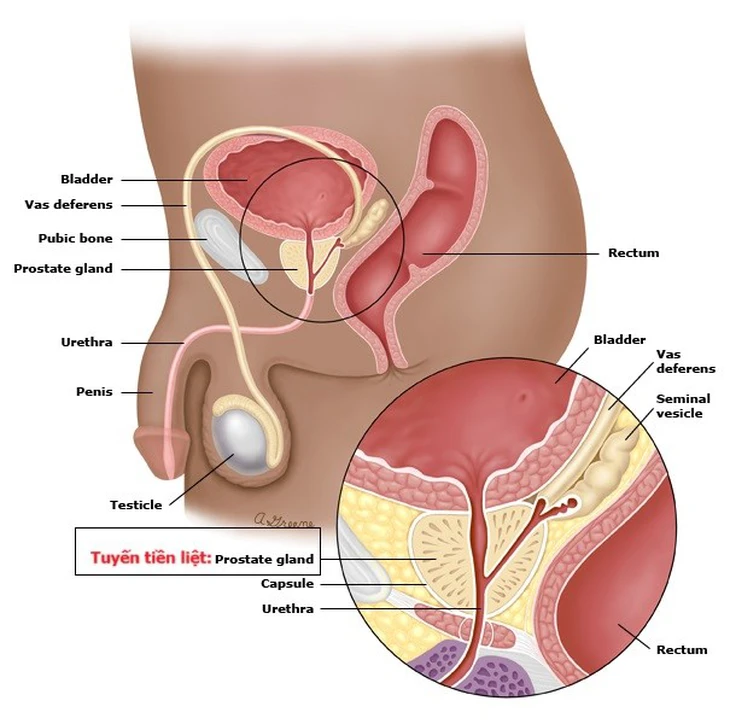
Prostate cancer - Illustration photo
According to GLOBOCAN statistics in Vietnam, prostate cancer is one of the 10 most common cancers in men. Currently, most cases are detected when the cancer has entered a late stage.
The disease progresses silently and is easily overlooked.
Former US President Joe Biden has just discovered that he has prostate cancer that has spread to the bone at the age of 82. According to the American Cancer Society, one in eight men will be diagnosed with this cancer during their lifetime.
Prostate cancer, also known as prostate cancer, is a malignant tumor that develops from the prostate - a small gland located below the bladder, which plays a role in producing semen.
In the early stages, the disease progresses silently, often without obvious symptoms. Many cases are only discovered through routine health check-ups or general abdominal ultrasound.
According to Dr. Pham Cam Phuong - Director of the Center for Nuclear Medicine and Oncology, Bach Mai Hospital - in the early stages, ultrasound may only show small calcifications in the prostate, causing no pain or urinary disorders.
When prostate cancer begins to invade and metastasize, it often causes symptoms such as difficulty urinating, small urine stream. Frequent urination of varying degrees, depending on stimulation, feeling of incomplete urination due to excess urine in the bladder. Incontinence, acute urinary retention.
In the late stages, most prostate cancer patients have metastatic lesions in the bones, lymph nodes, lungs, and liver. Specifically, when the lymph nodes metastasize, lymph nodes will appear in the groin and abdomen.
When bone metastasis occurs, patients experience bone pain, some have broken bones and go to the doctor to find out they have prostate cancer.
Some cases have blood clots in the blood vessels, then bone metastasis is discovered. Prostate cancer invades the bone marrow, the patient has symptoms of anemia.
"There are many cases where patients only go to the hospital because of prolonged back pain or joint pain, and only after going to the doctor do they discover metastatic bone or lymph node lesions...", said Dr. Phuong.
Prostate cancer often metastasizes to the bones.
According to Dr. Phuong, prostate cancer progresses silently. When symptoms appear, the disease is often in a late stage, has invaded, and has the potential to metastasize.
"Prostate cancer is one of the cancers with the highest potential to cause bone metastasis, bone metastasis occurs in 60% of late-stage prostate cancer cases. Bones that are commonly metastasized include: spine, pelvis, ribs, femur...", said Dr. Phuong.
Bone metastasis is a condition in which cancer cells arise, escape, and then spread to the bone from the original tumor. Experts are still not sure why some cancers spread to the bone instead of affecting another location.
The cancers most likely to metastasize to bone are prostate cancer, breast cancer, and lung cancer.
According to Dr. Phuong, depending on the stage of the disease, the level of invasion and the patient's condition, the doctor may prescribe one or a combination of treatment methods such as surgery, radiotherapy, endocrine therapy, and radioactive implants.
Proactively prevent disease from middle age
According to Dr. Phuong, more than 90% of prostate cancers are adenocarcinomas, mainly well-differentiated. If detected early, the cure rate is 90%. However, about half of patients have distant metastases when diagnosed, most commonly bone metastases. In the late stages, the 5-year survival rate is less than 50%.
"Although prostate cancer cannot be completely prevented, men can reduce their risk of developing the disease by maintaining a healthy lifestyle: eating lots of green vegetables, limiting red meat and saturated fat; exercising regularly; limiting alcohol and not smoking.
Men over 50 years old, especially those whose relatives have had prostate cancer, should proactively go for regular health check-ups, perform prostate ultrasound or PSA test for early screening," Dr. Phuong recommended.
Source: https://tuoitre.vn/ong-biden-bi-ung-thu-tuyen-tien-liet-loai-ung-thu-de-di-can-den-xuong-20250519101938366.htm






























![[Photo] National Assembly Chairman attends the seminar "Building and operating an international financial center and recommendations for Vietnam"](https://vphoto.vietnam.vn/thumb/1200x675/vietnam/resource/IMAGE/2025/7/28/76393436936e457db31ec84433289f72)





































































Comment (0)